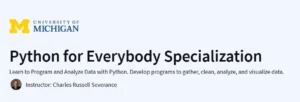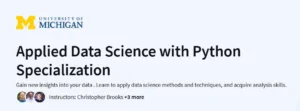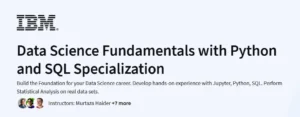What will you learn in this Data Science: Statistics and Machine Learning Specialization Course
Statistical Inference: Understand the process of drawing conclusions about populations or scientific truths from data.
Regression Models: Perform regression analysis, least squares, and inference using regression models.
Machine Learning: Build and apply prediction functions, understanding concepts such as training and test sets, overfitting, and error rates
Data Product Development: Develop public data products and create interactive data visualizations.
Capstone Project: Apply the skills learned to build a data product using real-world data.
Program Overview
1. Statistical Inference
⏳ 54 hours
Learn to make informed data analysis decisions using p-values, confidence intervals, and permutation tests
2. Regression Models
⏳ 53 hours
Understand ANOVA and ANCOVA model cases, and investigate analysis of residuals and variability.
3. Practical Machine Learning
⏳ 8 hours
Cover the basic components of building and applying prediction functions with an emphasis on practical applications.
4. Developing Data Products
⏳ 10 hours
Create interactive data visualizations and develop data products that tell a story to a mass audience.
5. Data Science Capstone
⏳ 5 hours
Build a data product using real-world data, demonstrating mastery of the material.
Get certificate
[/wpsm_itinerary_item]
Job Outlook
Equips learners for roles such as Data Analyst, Data Scientist, and Machine Learning Engineer.
Provides foundational skills applicable in industries like finance, healthcare, marketing, and technology.
Enhances employability by teaching practical skills in data analysis and machine learning.
Specification: Data Science: Statistics and Machine Learning Specialization
|
FAQs
- Basic programming knowledge is helpful but not mandatory.
- Introductory statistics or math background aids understanding.
- The course introduces statistical and ML concepts from scratch.
- Designed for beginners and aspiring data scientists.
- Builds progressively from foundational to advanced topics.
- Descriptive and inferential statistics.
- Regression, classification, and clustering algorithms.
- Feature engineering and model evaluation.
- Hypothesis testing and probability distributions.
- Introduction to predictive modeling and machine learning pipelines.
- Includes exercises using Python or R for data analysis.
- Projects involve real-world datasets.
- Covers end-to-end ML workflows from preprocessing to evaluation.
- Encourages experimentation with models and hyperparameters.
- Helps build a portfolio of applied data science projects.
- Python libraries such as pandas, NumPy, scikit-learn, and Matplotlib.
- R and associated statistical packages (if applicable).
- Jupyter Notebook or RStudio for coding and experimentation.
- Data visualization and reporting tools.
- Techniques for integrating ML models into analytics workflows.
- Prepares for roles like data scientist, data analyst, or ML engineer.
- Builds practical skills for predictive analytics and modeling.
- Supports portfolio development for job applications.
- Enhances analytical and problem-solving skills.
- Provides foundational knowledge for advanced AI and ML courses.





